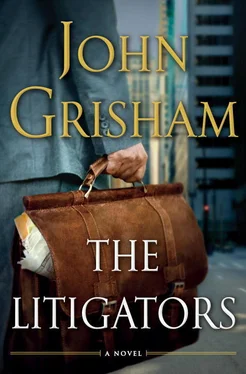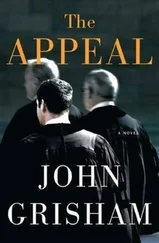He continued: “Now, I have reviewed three other lawsuits involving this defendant and its products, and, frankly, I’m not impressed with Varrick’s integrity or its ability to abide by the rules of discovery. The company, it seems, has a great deal of trouble turning over documents to the other side. It has been caught red-handed concealing documents. It has been sanctioned by judges at the state and federal levels. It has been embarrassed before juries and paid dearly with large verdicts, yet it continues to hide documents. At least three times, its executives have been charged with perjury. Ms. Karros, how can you assure me that your client will play by the rules?”
She glared at the judge, paused for a moment in a stare-down, then said, “I was not the attorney for Varrick Labs in those other cases, Your Honor, and I don’t know what happened there. I will not be tainted by lawsuits I had nothing to do with. I know the rules inside and out, and my clients always play by the rules.”
“We’ll see. Your client needs to be warned that I am watching closely. At the first hint of a discovery violation, I will haul the CEO into this courtroom and draw blood. Do you understand me, Ms. Karros?”
“I do.”
“Mr. Figg, you have not yet made a request for documents. When might this happen?”
“We’re working on that now, Your Honor,” Wally said with as much confidence as possible. “We should have it in a couple of weeks.” Alisandros had promised an exhaustive list of documents to be sought from Varrick but had yet to come through.
“I’m waiting on you,” Seawright said. “This is your lawsuit. You filed it, now let’s get going.”
“Yes sir,” Wally replied anxiously.
“Anything else?” he asked.
Most of the lawyers shook their heads. His Honor seemed to relax somewhat as he chewed on the cap of his pen. He said, “I’m thinking this case might do well under Local Rule 83:19. Have you considered this, Mr. Figg?”
Mr. Figg had not, because Mr. Figg was not aware of Local Rule 83:19. He opened his mouth, but only dry came forth. David quickly picked up the flag and spoke his first words in court: “We’ve considered that, Your Honor, but we have not yet discussed it with Mr. Alisandros. We should make a decision within the week.”
Seawright looked at Nadine Karros and said, “And your response?”
“We are the defense, Your Honor, and we are never eager to go to trial.” Her candor amused the judge.
Wally whispered to David, “What the hell’s Rule 83:19?”
David whispered back, “The Rocket Docket. Streamline the case. Balls to the wall.”
“We don’t want that, do we?” Wally hissed.
“No. We want to settle and cash in.”
“No need to file a motion, Mr. Figg,” His Honor said. “I’m placing this case in 83:19 status. On the fast track, Mr. Figg, so let’s get things moving along.”
“Yes sir,” Wally managed to mumble.
Judge Seawright tapped his gavel and said, “We’ll meet again in sixty days, and I expect Mr. Alisandros to be here. Adjourned.”
As David and Wally were stuffing files and notepads into their briefcases in hopes of a fast exit, Nadine Karros sauntered over for a quick hello. “Nice to meet you, Mr. Figg, Mr. Zinc,” she said with a smile that made Wally’s nervous heart skip another beat.
“A pleasure,” he said. David returned the smile as he shook her hand.
“This promises to be a long, bruising fight,” she said, “with a lot of money on the table. I try to keep things on a professional level and hard feelings at a minimum. I’m sure your firm feels the same way.”
“Oh yes,” Wally gushed, and almost asked her to go have a drink. David wasn’t as easily manipulated. He saw her as a pretty face and a warm facade, but just below the surface was a ruthless combatant who would enjoy watching you bleed in open court.
“I guess I’ll see you next Wednesday,” she said.
“If not sooner,” Wally said, a lame attempt at humor.
As she stepped away, David grabbed Wally by the arm and said, “Let’s get out of here.”
Now that Helen was expecting and her future would be consumed with the baby, her studies at Northwestern seemed less important. She dropped one class because of morning sickness, and she was struggling with motivational problems in most of her others. David was pushing her, delicately, but she wanted to take a break. She was almost thirty-four, thrilled at the prospect of becoming a mother, and losing interest quickly in a doctorate in art history.
On a frigid day in March, they were having lunch in a café near the campus when Toni Vance, Helen’s friend from class, happened to drop by. David had met her only once. She was ten years older and had two teenagers and a husband who had something to do with containerized shipping. She also had the Burmese housekeeper with a grandson who was alive but probably brain damaged. David had urged Helen to push Toni to arrange a meeting, but the housekeeper had not been cooperative. Snooping, without violating laws or anyone’s privacy, David had learned that the little boy was five years old and for the past two months had been in intensive care at the Lakeshore Children’s Hospital on Chicago’s North Side. His name was Thuya Khaing, and he had been born in Sacramento, so he was a U.S. citizen. As for his parents, David had no way of knowing their immigration status. Zaw, the housekeeper, supposedly had a green card.
“I think Zaw would talk to you now,” Toni said as she sipped an espresso.
“When and where?” David asked.
She glanced at her watch. “My next class is over at two, then I’ll go home. Why don’t you guys stop by?”
At 2:30, David and Helen parked behind a Jaguar in the driveway of a striking contemporary house in Oak Park. Whatever Mr. Vance did with containerized cargo, he did it well. The house jutted here and there, up and down, with lots of glass and marble and no discernible design. It tried desperately to be unique, and it succeeded greatly. They finally located the front door and were met by Toni, who’d found time to change outfits and was no longer trying to look like a twenty-year-old student. She led them to a sunroom with full views of the sky and clouds, and moments later Zaw entered with a tray of coffees. Introductions were made.
David had never met a Burmese woman, but he guessed her age at sixty. She was petite in her maid’s uniform, with short, graying hair and a face that seemed locked into a perpetual smile.
“Her English is very good,” Toni said. “Please join us, Zaw.” Zaw awkwardly sat on a small stool near her boss.
“How long have you been in the United States?” David asked.
“Twenty year.”
“And you have family here?”
“My husband is here, work for Sears. My son too. Work for tree company.”
“And he’s the father of the grandson who’s in the hospital?”
She nodded slowly. The smile vanished at the mention of the boy.
“Yes.”
“Does the boy have brothers and sisters?”
She flashed two fingers and said, “Two sister.”
“Have they been sick too?”
“No.”
“Okay, can you tell me what happened when the boy got sick?”
She looked at Toni, who said, “It’s okay, Zaw. You can trust these people. Mr. Zinc needs to hear the story.”
Zaw nodded and began talking, her eyes glued to the floor. “He get real tired all the time, sleep a lot, then bad pain here.” She tapped her stomach. “He cry so hard because of the pain. Then he start to vomit, every day he vomit, and he lose weight, get real skinny. We take him to doctor. They put him in hospital and he go to sleep.” She touched her head. “They think he has brain problem.”
Читать дальше












